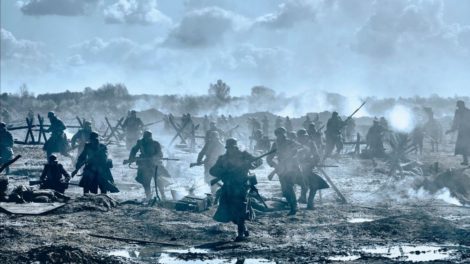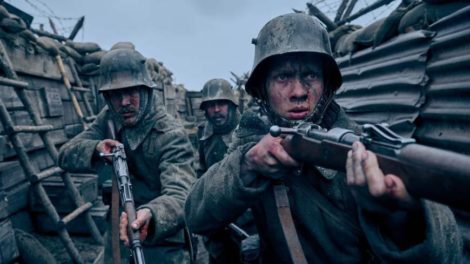All Quiet on the Western Front
Front Row at the Movies by Shirrel Rhoades
[mr_rating_result]You may not be familiar with a 1929 book titled “Nothing New in the West” (original title: “Im Westen nichts Neues”); however, you might recognize its popular name: “All Quiet on the Western Front.” Written by Erich Maria Remarque, the novel examines the trauma of war. It was banned in Nazi Germany.
This masterful tale of being a German soldier in World War I was adapted into an Academy Award-winning film in 1930. Also it was turned into a TV movie in 1979. And now we have a new version of “All Quiet on the Western Front” showing on Netflix and in theaters.
 Set in the closing days of World War I, the story follows a 17-year-old German soldier named Paul Bäumer. After enlisting in the German Army with his three friends, Paul’s romantic views of war are dashed by the realities of trench warfare on the Western Front in Northern France. Rather than becoming a hero, Paul Bäumer finds he is instead merely trying to survive.
Set in the closing days of World War I, the story follows a 17-year-old German soldier named Paul Bäumer. After enlisting in the German Army with his three friends, Paul’s romantic views of war are dashed by the realities of trench warfare on the Western Front in Northern France. Rather than becoming a hero, Paul Bäumer finds he is instead merely trying to survive.
Directed and co-written by Edward Berger (“Female 2 Seeks Happy End,” “All My Loving”), the new film stars Felix Kammerer as the young German soldier. His three army buddies are played by Aaron Hilmer, Moritz Klaus, and Adrian Grünewald. Others in the cast include Albrecht Schuch, Daniel Brühl, Sebastian Hülk, and Thibault de Montalembert.
“Felix Kammerer had never been in front of a camera before,” says the Edward Berger. “This was his first movie, and we found him in a theater in Vienna, because the producer’s wife works there … He usually plays small parts there, but he’s such a wonderful actor we invited him for casting maybe four or five times. The second time, we put a uniform on him, because he’s also very elegant – he can dance really well – so I wanted to ground him a bit more. As soon as he had the boots and the uniform on, he walked differently. And just from each casting, he started inhabiting this role more and more. By the fifth time or so, we knew this was the guy, even if he had never done it before.”
The film has been nominated for nine Oscar nominations, including Best Picture, Best International Feature, and Best Adapted Screenplay.
Berger says, “I took the British script that existed and imbued it with that sense that I just talked about, while taking things from the novel, taking things from research, and taking things from inside of me. There were also certain poetic elements that we added.”
For instance, the film has a parallel storyline not found in the book, which follows the armistice negotiations to end the war.
“The north star during the rewriting and during the planning of the movie was always the novel,” Berger says. He cites its “really interesting reportage feeling.”
 “All Quiet on the Western Front” focuses on the futility of war, “It’s a gritty pull-no-punches look at the horrors of war. Limbs are lost, horses are destroyed, starving soldiers root through garbage for food, the troops are ravaged by poison gas and artillery bombs, and few make it out alive.” Horrific.
“All Quiet on the Western Front” focuses on the futility of war, “It’s a gritty pull-no-punches look at the horrors of war. Limbs are lost, horses are destroyed, starving soldiers root through garbage for food, the troops are ravaged by poison gas and artillery bombs, and few make it out alive.” Horrific.
“There’s nothing honorable about war,” says the German filmmaker. “There’s just shame and guilt and terror and a sense of responsibility towards that history. I would never be able to tell a heroic story and I felt that, with this movie and with this story, and it’s a German novel, to tell it with that perspective, to imbue every creative decision with that history with that sense of guilt or shame, then it just makes a very different movie and I thought it might be interesting for other countries to watch that and to share that with other countries.”
“All Quiet on the Western Front” remains one of the great anti-war stories of all time. It’s a lesson for us all.
Email Shirrel: srhoades@aol.com


Ratings & Comments
[mr_rating_form]